Purley Plastics - Materials
Offering you the widest choice of plastics to exactly suit your needs. These are just an example.
SAN Styrene Resin

Our most popular material, SAN (Styrene Acrylonitrile) is a hard rigid transparent material. The transmittance in the visible range is greater than 90% therefore it is easily coloured, it is also resistant to thermal shock and has a good chemical resistance.
The combination of transparency and resistance to oils, fats and cleaning agents make SAN very suitable for use in the kitchen as mixing bowls etc. It is also used for the outer casings of thermally insulated jugs, jars and beakers as well as storage containers for all kinds of foods.
ABS Plastic Resin
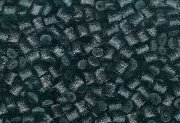
ABS is a thermoplastic resin commonly used for injection molding applications. ABS (Acrylonitrile Butadiene Styrene) generally possesses medium strength and performance at medium cost. It is available in multiple grades, colors, and Izod impact ratings.
End uses of ABS materials include tub/shower surrounds, pickup truck caps, boat accessories, automotive trim parts, and computer housings.
Acetal Resin
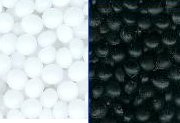
HDPE Resins
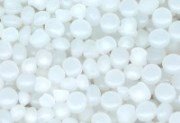
Polyethylene is a common thermoplastic resin typically used for injection molding applications. - Polymers with densities ranging from .941 to .965 and over are considered high density. High Density Polyethylene (HDPE) has a high-impact strength with a higher operating temperature than LDPE. HDPE has excellent tensile strength, energy consumption, abrasion resistance, and resistance to stress cracks, and good chemical resistance and electrical properties. Injection-molded HDPE is resistant to warpage and distortion.
LDPE Resins
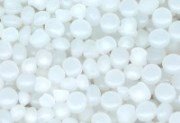
LDPE (Low-Density Polyethylene) Resin / Pellets - Polyethylene is a common thermoplastic resin typically used for injection molding applications. Polymers with densities less than .941 are considered low density. LDPE is most commonly used for plastic bags. It is widely used for manufacturing various containers, dispensing bottles, wash bottles, tubing, plastic bags for computer components, and various molded laboratory equipment. It is translucent to opaque, virtually unbreakable, and very flexible.
Nylon Resins
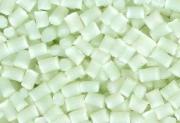
Nylon resins are available in a wide range of grades and colors. Their flexibility and performance characterics have led to Nylons replacing bronze, brass, steel, and aluminum in various mechanical applications.
Nylon offers the following benefits:
- Approximately 1/8 the weight of bronze
- 1/7 the weight of cast iron
- 1/2 the weight of aluminum
- Highly impact resistance
- High heat distortion temperature
- Easy to machine and abrasion resistance


